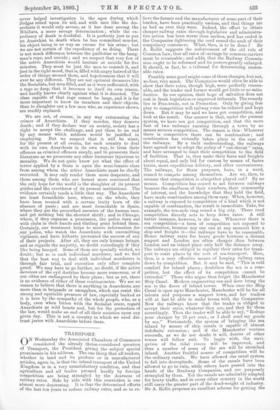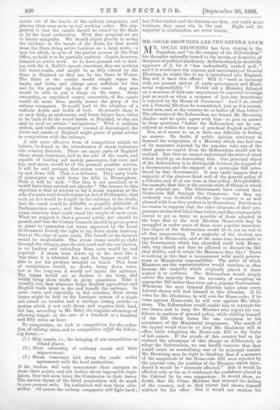TRANSPORT.
ON Wednesday the Associated Chambers of Commerce considered the already thrice-considered question of Transport, the President giving the subject special prominence in his address. The one thing that all traders, whether in land and its produce or in manufactured articles, agree in, is that the inland transport of the United Kingdom is in a very unsatisfactory condition, and that agriculture and all trades pressed hardly by foreign competition are being strangled by the dearness of railway rates. Side by side with this conviction is one almost more depressing. It is that the determined efforts of the last ten years to reduce railway rates, and so to re- lieve the farmer and the manufacturer of some part of their burden, have been practically useless, and that things are as bad as ever they were. Indeed, the effort to obtain cheaper railway rates through legislative and administra- tive action has been worse than useless, and has ended in the Companies tightening the cord round the neck of their compulsory customers. What, then, is to be done P Sir A. Rollit suggests the enforcement of the old rule of Common Law, that all rates of carriage by common carriers must be reasonable ; and adds, that the Railway Commis- sion ought to be reformed and its powers greatly enlarged. It should, in fact, be a tribunal for determining reason- able rates.
Possibly some good might come of these changes, but not, we fear, very much. The Companies would often be able to show that their rates, though high, were perfectly reason- able, and the trader and farmer would get little or no satis- faction. In our opinion, their hope of salvation does not rest in fresh legislation or improved tribunals. The remedy lies in Free-trade, not in Protection. Only by giving free play to competition will railway rites be reduced and kept down. But it may be said we have got competition, and look at the result. Our answer is that, under the present system, we have not got competition, and that the mere fact of two railways running through a town by no means secures competition. The reason is this : Wherever there is competition there can be combination ; and combination has virtually taken place in the case of the railways. By a tacit understanding, the railways have agreed not to adopt the policy of " cut-throat " rates, and have arranged to limit their competition to the field of facilities. That is, they make their fares and freights about equal, and only bid for custom by means of faster trains, more expeditious delivery, and other conveniences. The railways, for State purposes, have, in a word, ceased to compete among themselves. Are we, then, to assume that competition is altogether played out ? By no means. Competition has ceased to act between railways because the smallness of their numbers, their community of interest, and the knowledge that they hold the field, have made combination among them easy. When, however, a railway is exposed to competition of a kind which is not capable of combination, the result is immediate, Take, for example, the ten-mile ring round a big city. There road competition directly acts to keep down rates. A still better instance, however, is the sea. Whenever there is sea competition—a form of competition not exposed to combination, because any one can at any moment hire a .ship and freight it—the railways have to be reasonable. Hence railway rates for heavy goods between a distant seaport and London are often cheaper than between London and an inland place only half the distance away. The railways are obliged to regulate their rates for trans- port to coast places by the cost of sea-transport. Here, then, is a very effective means of keeping railway rates down by competition. But it may be said, This is cold comfort for inland places ; doubtless the sea, is a com- petitor, but the effect of its competition cannot be extended." Those who argue thus forget the Manchester Ship Canal. Modern engineering can and. does bring the sea to the doors of inland towns. When once the Ship Canal is open up to Manchester, Manchester will be for all intents and purposes a seaport town, and her traders will at last be able to make terms with the Companies. Now the railways know tliat the trader is obliged to accept their rates, whatever they are, and they fix them accordingly. Then the trader will be able to say, "Reduce your charges by 2,5 per cent., or I shall send my goods by sea." Fortunately, the system of bringing the sea inland by means of ship canals is capable of almost indefinite extension ; and if the Manchester venture succeeds, as we do not doubt it will, dozens of other towns will follow suit. To begin with, the navi- gation of the tidal rivers will be improved, and thus a number of arms of the sea will be stretched inland. Another fruitful source of competition will be the ordinary canals. We have allowed our canal system to fall into decrepitude. Some of the canals have been allowed to go to ruin, while others have passed into the hands of the Rrailway Companies, and are purposely strangled by them. Yet the canals are admirably adapted for heavy traffic, and in every other country in the world still carry the greater part of the dead-weight of industry. Sir A. Rollit proposes an excellent scheme for getting the canals out of the hands of the railway companies, and placing them once more in real working order. His sug- gestion is that the canals should be owned by the State or by the local authorities. With that proposal we are in hearty sympathy. We should object greatly to seeing the railways in the hands of the State, for that would mean the State doing active business on a large scale,—a task for which, in spite of the partial success of the Post Office, we hold it to be partially unfitted. Canals, however, demand no active work. As we have pointed out in deal- ing with Sir A. Rollit's speech elsewhere, they are nothing but water-roads, and might be as fitly owned by the State in England as they are by the State in Venice. The State or the county would simply repair the banks and locks, and charge rates sufficient for this and for the general up-keep of the canal. Any man would be able to put a barge on the water. State ownership, or regulated county ownership, of the canals would do more than merely loosen the grasp of the railway companies. It would load to the adoption of a uniform depth and width of lock. At present there is no such thing as uniformity, and hence barges have either to be built to fit the worst canals in England, or else can only be used on certain " navigations." With a uniform system, and traffic encouraged instead of discouraged, the rivers and canals of England might prove of great service is competitors with the railways.
A still more effective form of competition might, we believe, be found in the introduction of steam tramways into country districts. There are many parts of England where steam tramways, laid at the side of the roads, and capable of hauling not merely passengers, but corn, and hay, and straw, would be of the greatest possible service. It will be said, perhaps, that steam tramways cannot go up and down hill. That is a delusion. They carry loads of passengers up and down the hills in Birmingham. Next it will be said, "The idea is not practical, or it would have been carried out already." The answer to this objection is that at present to lay a steam tramway at the side of a main road would require an Act of Parliament; that such an Act would be fought by the railways to the death; that the result would be £50,000, or possibly £100,000, of Parliamentary costs ; and that no small enterprise of the steam tramway hind could stand the weight of such costs. What we suggest is that a general public Act should be passed, and that the County Councils should be given power to grant to companies (on terms approved by the Local Government Board) the right to lay down steam tramway lines at the edge of main roads. The benefit to the farmers would be incalculable. The steam trains would go right through the villages, past the rick-yard and the cow-barton, so no loading and unloading from carts would be and required. A steam tram draws up at the door like a 'bus when it is whistled for, and the farmer would be able to put his produce straight on board. This form of competition would, no doubt, bring down rates, but in the long-run it would not injure the railways. The trains would act as feeders to the lines, and would bring them traffic in great quantities. Take it broadly, too that whatever helps English agriculture and English trade must in the end benefit the railways. In some cases, and especially in flat counties, these steam trains might be laid on the Lartigue system of a single rail raised on tressles and a carriage sitting astride—a system which is not only cheap and requires little land, but has, according to Mr. Behr, the singular advantage of allowing transit at the rate of a hundred or a hundred and fifty miles an hour.
To recapitulate we look to competition for the reduc- tion of railway rates, and to competition in:all the follow- ing forms :-- (1.) Ship canals, i.e., the bringing of sea competition to inland places. (2.) State ownership of ordinary canals and their improvement. (3.) Steam tramways laid along the roads under agreements with the local authorities.
If the traders will only concentrate their energies on these three points, and not bother about impossible legis- lation, they will soon bring the Companies to their knees. The serious threat of the third proposition will do much to cure present evils. Its realisation will cure them alto- gether. Of course the railway companies will fight hard ; but if the traders and the farmers are firm, and really mean business, they must win in the end. Right and the majority in combination are never beaten.



































 Previous page
Previous page